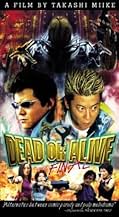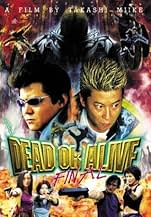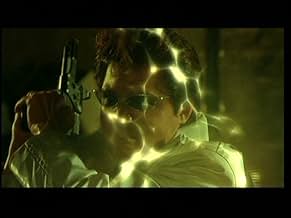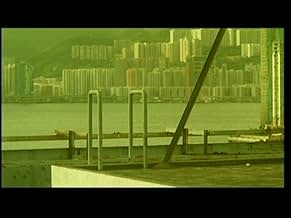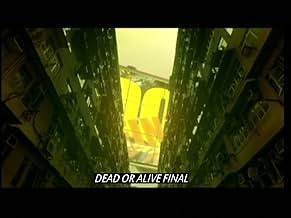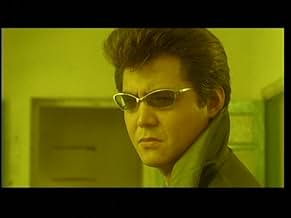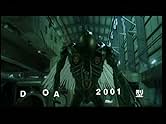ÉVALUATION IMDb
5,6/10
2,9 k
MA NOTE
Ajouter une intrigue dans votre langueThe ace cop of a totalitarian police force and a drifting android play their parts in a post-apocalyptic society. They are destined to fight. Their encounter will change them forever.The ace cop of a totalitarian police force and a drifting android play their parts in a post-apocalyptic society. They are destined to fight. Their encounter will change them forever.The ace cop of a totalitarian police force and a drifting android play their parts in a post-apocalyptic society. They are destined to fight. Their encounter will change them forever.
William Wai-Lun Duen
- Gangster
- (as William Duan)
Wai-Kwong Lo
- Gangster
- (as Kenneth Low)
Don Thai Theerathada
- Don
- (as Donald Panutat)
Histoire
Le saviez-vous
- ConnexionsEdited from Dead or Alive: Hanzaisha (1999)
Commentaire en vedette
I'm so honored to see I'm one of the 3 women who have rated DOA: Final on the IMDb that I feel compelled to comment. Look, Ma, I'm an arcane-trash-cinema hound! Yippee!
Right. Having seen all three DOA films in one evening at a triple-feature (this is what happens when you live in a small French city and only one cinema in town shows subtitled films), I'm in a terrific mood, because the movies were tons of fun. More fun than I'd been expecting, because Miike films seem to come accompanied with user comments like "Don't bring a girl to this." Thanks, guys. Anyway, DOA: Final is, sadly, easily the weakest of the trilogy. After DOA 1, which is a nutso, gutsy genre-jumping yakuza tale, and DOA 2, which pretends to be a yakuza tale for ten minutes and then turns into a Wim Wenders film (and a good one too), this last entry apparently wants to be science fiction. But, alas, it just can't cut the mustard.
Sho Aikawa is the bright point -- as effortlessly, unclassifiably entertaining here as he is in the first two DOAs. With his bad bleach job, crackily teenage voice, tracksuit and sneakers, and zen spaciness, he's as counterintuitive and appealing as you'd expect in his role as a battle cyborg, or "replicant," named Ryo. If I could just watch him hang out with nine-year-olds for two hours, that might be worth the admission price. But even a blond Sho Aikawa is no Rutger Hauer, and he can't make this film work.
The SF premise is of the most worn-out sort -- an authority figure is making people take anti-fertility drugs to stop them having children. Oh, no! The all-business, authoritarian hand of the state is placed in opposition to the natural world of human instinct, family bonds and lush jungle backdrops! That's enough to make a sci-fi movie, right? Throwing in a band of sex-friendly "rebels" doesn't help: Terence Yin and Maria Chen seem to have been cast more for their attractively Eurasian features and ability to look good in camos than for their acting talent. Admittedly, it's a tough trick to shuttle between three languages, but Yin's "acting" in English is just wince-worthy, and Chen isn't convincing even when she doesn't speak.
The pompadoured Riki Takeuchi is fun, as always, here in the role of a police chief caught in a moral dilemma about whether to enforce his boss's orders. But returning to that SF premise, we have the problem of an unaddressed: WHY? What's the motivating engine behind all this evil-drug, Mad-Max-type-rebellion, anti-family stuff? Miike's very hand-wavy about this -- "It's an overpopulation thing" -- but, and this is the bad part, he's none too subtle about suggesting the bad-guy mayor's obvious homosexuality has a lot to do with it. Thanks, Takashi Miike! I guess homosexuals really are the ultimate threat to the survival of humanity, huh? I mean, come on, this crap went out with "Dune." Watch Miike associate homosexuality with pedophilia, decadence, pastel scarves and -- a sign of true evil -- saxophone concerts, in order to see why this movie has to get a three-point deduction for catastrophic moronicity.
This is the only one of the three DOA films I wouldn't see again. It's not without its bright spots, but there are far too many negatives to make it hold together. In the little quality meter in my head, I was rating it as low as a 4/10, right up until the final five minutes. Then I started laughing my head off. The bizarreness of Miike's wrap-up pushes the whole experience up to a 5/10. But, you know, if an out-of-left-field conclusion improves the filmic experience, you can be pretty sure there's something wrong with the movie to begin with. Unfortunately, in this case there's quite a lot.
Right. Having seen all three DOA films in one evening at a triple-feature (this is what happens when you live in a small French city and only one cinema in town shows subtitled films), I'm in a terrific mood, because the movies were tons of fun. More fun than I'd been expecting, because Miike films seem to come accompanied with user comments like "Don't bring a girl to this." Thanks, guys. Anyway, DOA: Final is, sadly, easily the weakest of the trilogy. After DOA 1, which is a nutso, gutsy genre-jumping yakuza tale, and DOA 2, which pretends to be a yakuza tale for ten minutes and then turns into a Wim Wenders film (and a good one too), this last entry apparently wants to be science fiction. But, alas, it just can't cut the mustard.
Sho Aikawa is the bright point -- as effortlessly, unclassifiably entertaining here as he is in the first two DOAs. With his bad bleach job, crackily teenage voice, tracksuit and sneakers, and zen spaciness, he's as counterintuitive and appealing as you'd expect in his role as a battle cyborg, or "replicant," named Ryo. If I could just watch him hang out with nine-year-olds for two hours, that might be worth the admission price. But even a blond Sho Aikawa is no Rutger Hauer, and he can't make this film work.
The SF premise is of the most worn-out sort -- an authority figure is making people take anti-fertility drugs to stop them having children. Oh, no! The all-business, authoritarian hand of the state is placed in opposition to the natural world of human instinct, family bonds and lush jungle backdrops! That's enough to make a sci-fi movie, right? Throwing in a band of sex-friendly "rebels" doesn't help: Terence Yin and Maria Chen seem to have been cast more for their attractively Eurasian features and ability to look good in camos than for their acting talent. Admittedly, it's a tough trick to shuttle between three languages, but Yin's "acting" in English is just wince-worthy, and Chen isn't convincing even when she doesn't speak.
The pompadoured Riki Takeuchi is fun, as always, here in the role of a police chief caught in a moral dilemma about whether to enforce his boss's orders. But returning to that SF premise, we have the problem of an unaddressed: WHY? What's the motivating engine behind all this evil-drug, Mad-Max-type-rebellion, anti-family stuff? Miike's very hand-wavy about this -- "It's an overpopulation thing" -- but, and this is the bad part, he's none too subtle about suggesting the bad-guy mayor's obvious homosexuality has a lot to do with it. Thanks, Takashi Miike! I guess homosexuals really are the ultimate threat to the survival of humanity, huh? I mean, come on, this crap went out with "Dune." Watch Miike associate homosexuality with pedophilia, decadence, pastel scarves and -- a sign of true evil -- saxophone concerts, in order to see why this movie has to get a three-point deduction for catastrophic moronicity.
This is the only one of the three DOA films I wouldn't see again. It's not without its bright spots, but there are far too many negatives to make it hold together. In the little quality meter in my head, I was rating it as low as a 4/10, right up until the final five minutes. Then I started laughing my head off. The bizarreness of Miike's wrap-up pushes the whole experience up to a 5/10. But, you know, if an out-of-left-field conclusion improves the filmic experience, you can be pretty sure there's something wrong with the movie to begin with. Unfortunately, in this case there's quite a lot.
- life_on_screen
- 15 févr. 2005
- Lien permanent
Meilleurs choix
Connectez-vous pour évaluer et surveiller les recommandations personnalisées
Détails
- Date de sortie
- Pays d’origine
- Site officiel
- Langues
- Aussi connu sous le nom de
- Dead or Alive 3: Duelo final
- Lieux de tournage
- sociétés de production
- Consultez plus de crédits d'entreprise sur IMDbPro
Box-office
- Brut – États-Unis et Canada
- 2 591 $ US
- Fin de semaine d'ouverture – États-Unis et Canada
- 1 841 $ US
- 1 déc. 2002
- Brut – à l'échelle mondiale
- 2 591 $ US
Contribuer à cette page
Suggérer une modification ou ajouter du contenu manquant

Lacune principale
By what name was Dead or Alive: Final (2002) officially released in Canada in English?
Répondre

